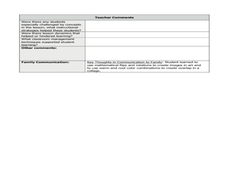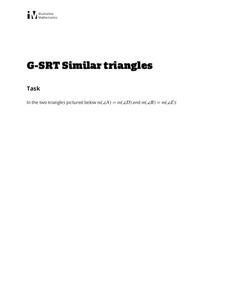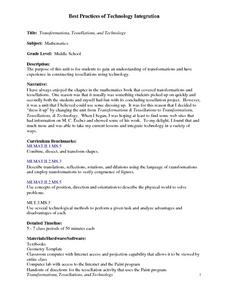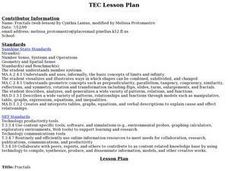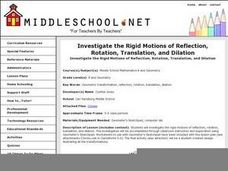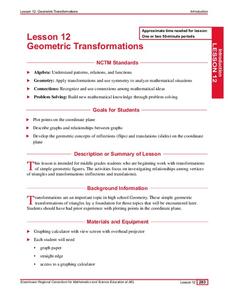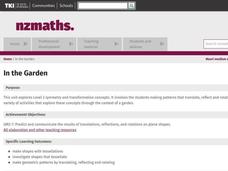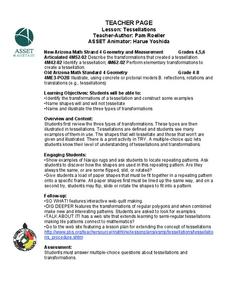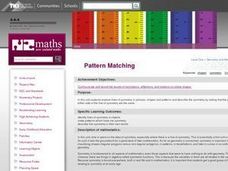Virginia Department of Education
Rotation
Rotate this resource into your lesson plans. Scholars rotate polygons in the coordinate plane by multiples of 90 degrees. They then compare the original and new figures to develop conjectures about coordinate points after rotations.
Virginia Department of Education
Dilation
Open up your pupils' eyes and minds on dilations. Scholars perform dilations on a trapezoid on the coordinate plane. They compare the image to the preimage and develop generalizations about dilations.
Curated OER
Geometric Collages
Fourth graders investigate the concept of geometric patterning. They create their own patterns with a few basic requirements. The patterns must illustrate the concepts of flipping, 90 and 180 degree rotations. The collages also consist...
EngageNY
Are All Parabolas Similar?
Congruence and similarity apply to functions as well as polygons. Learners examine the effects of transformations on the shape of parabolas. They determine the transformation(s) that produce similar and congruent functions.
EngageNY
Four Interesting Transformations of Functions (Part 1)
Understanding how functions transform is a key concept in mathematics. This introductory lesson makes a strong connection between the function, table, and graph when exploring transformations. While the resource uses absolute value...
Illustrative Mathematics
Similar Triangles
Proving triangles are similar is often an exercise in applying one of the many theorems young geometers memorize, like the AA similarity criteria. But proving that the criteria themselves are valid from basic principles is a great...
Curated OER
Transformations
High schoolers explore the concept of transformations. In this transformations lesson, students use Geometer's Sketchpad to construct cyclic and dihedral figures. High schoolers study reflection and rotation symmetry. Students discuss...
Curated OER
Count The Letters
Students perform activities involving ratios, proportions and percents. Given a newspaper article, groups of students count the number of letters in a given area. They use calculators and data collected to construct a pie chart and bar...
Curated OER
Cracks on the Walls
High schoolers observe the cracks in school walls and pavements. In this geometry lesson, students explore the factors to be considered before building a structure. They complete a graphing and calculation worksheet after the...
Curated OER
What's the Spin?
Learners use the CABRI application for their graphing calculator to rotate, translate, and reflect triangles. They use graphing calculators and follow detailed directions to manipulate triangles in specified ways. There are three...
Curated OER
Ecology - Biodiversity Lab
Studnents examine the degree of biodiversity that exists in one's everyday environment, in order to develop an understanding of how scientists classify organisms and to explain why biodiversity is important for living things.
Curated OER
Quandaries, Quagmires, and Quadrilaterals
Students classify, flip, slide, and turn a quantity of quadrilaterals.
Curated OER
Transformations, Tessellations, and Technology
Students complete a unit about transformations and tessellations. They explore various tessellation websites, determine which shapes tessellate, complete a log about which website activities they complete, and create a tessellation...
Curated OER
What are Fractals?
Middle and high schoolers identify and analyze fractals and research information using the Internet to locate information about them. They look at fractals in relation to nature and other real world situations. Pupils create several...
Curated OER
Investigate the Rigid Motions of Reflection, Rotation, Translation, and Dilation
Students investigate the rigid motions of reflection, rotation, translation, and dilation. This investigation be accomplished through classroom instruction and exploration using Geometer's Sketchpad.
Curated OER
Tessellations
Students identify shapes that will tessellate. They construct a tessellation using transformations. Students identify transformations in tessellations. They identify applications of transformations such as tiling and fabric design.
Curated OER
Geometric Transformations
Pupils solve problems involving transformations of geometric figures. They review graphing points in the coordinate plain, plot points and connect to create a triangle. Then, they reflect triangles over the x and y axis and use graphing...
Curated OER
In The Garden
Students examine symmetry and transformation concepts. They create patterns that translate, reflect and rotate. Students participate in a variety of activities that explore transformation concepts through the context of a garden.
Curated OER
Tessellations
Young scholars form repeating patterns using tessellations. In this tessellations lesson plan, students identify shapes and illustrate three types of transformations. A website is included with the lesson plan which provides extension...
Curated OER
Pattern Matching
First graders examine how to determine the lines of symmetry in pictures, shapes, and patterns by completing the lessons in this unit. They make patterns that show a line of symmetry and describe it using their own language.
Curated OER
Making Shapes
Tenth graders construct geometric figures using compasses and protractors.
Curated OER
Fold and Cut
Second graders explore line symmetry and the names and attributes of two-dimensional mathematical shapes. They study the context by folding and cutting out shapes to make a series of mathematical shapes.
Curated OER
Transformations
Tenth graders recognize, perform and derive rules for basic transformations including translation, reflection and rotation. They also consider compositions, a combination of two or more basic transformations. Students explore both...
Curated OER
Symmetry In Nature
Students investigate the symmetry that is found in nature. They view shapes and patterns in nature while looking at images. Students look for tessellations while obtaining photographs with a digital camera. The information is used for...




